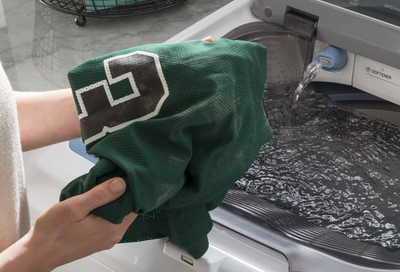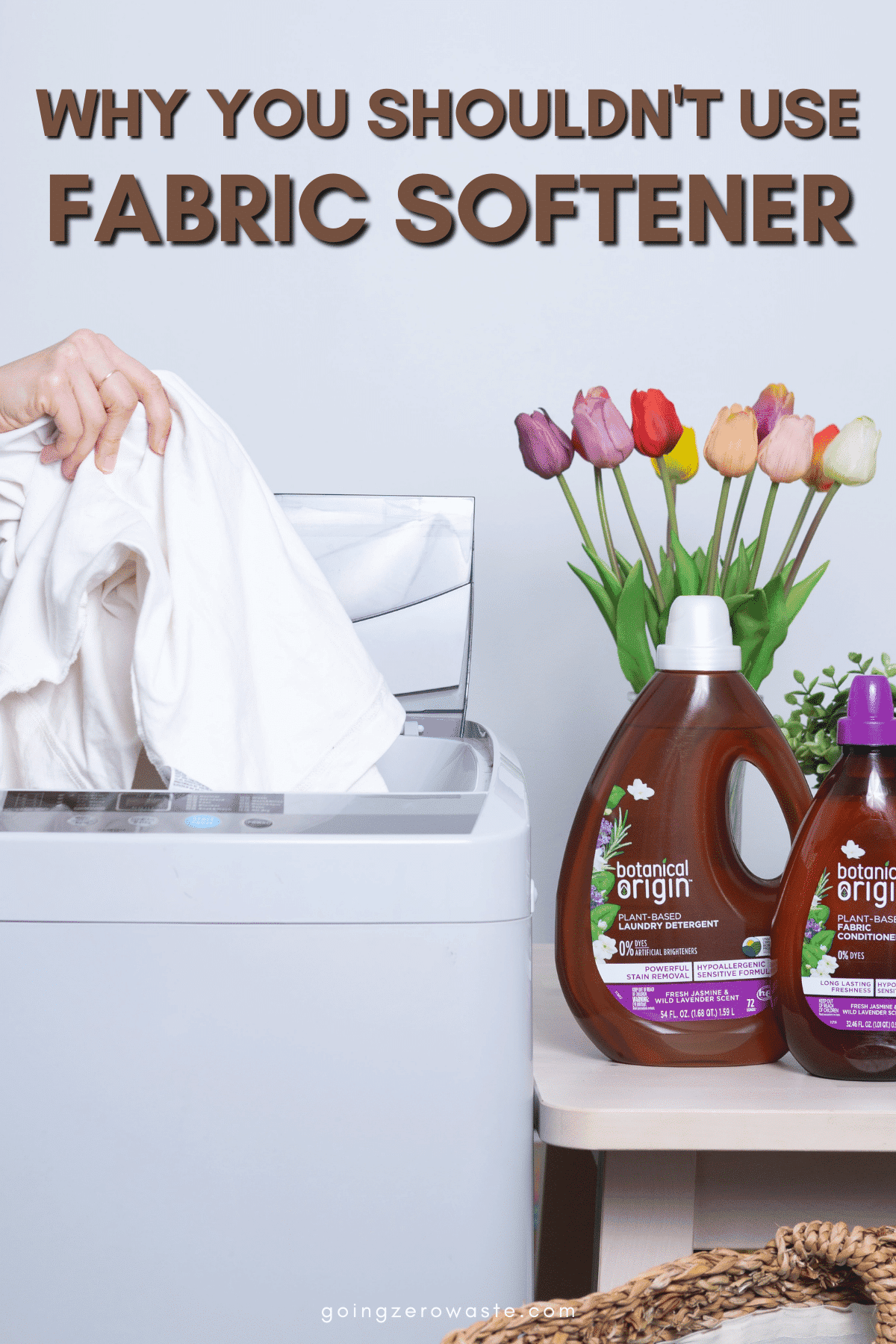Fabric softener can potentially damage clothes by breaking down fibers and reducing their absorbency. Using fabric softener can also leave a residue on clothes that can irritate sensitive skin.
Fabric softener is a commonly used laundry product that many people use to make their clothes feel softer and more comfortable to wear. However, some people are concerned that using fabric softener may actually damage their clothes over time. While fabric softener can make clothes feel softer, it can also cause damage to the fibers in the fabric.
This can lead to reduced absorbency and increased wear and tear. Additionally, fabric softener can leave a residue on clothes that can irritate sensitive skin. To keep your clothes looking and feeling their best, it may be best to avoid using fabric softener and opt for other laundry products instead.

Credit: www.reddit.com
Contents
The Fabric Softener Debate
Common Beliefs About Fabric Softeners
Fabric softeners are a staple in many households, with users swearing by their ability to keep clothes soft, fresh, and static-free. However, there is a growing concern about the potential damage that fabric softeners may cause to clothing over time. Common beliefs about fabric softeners often center around their impact on fabric quality and longevity.
The Science Behind Softening Agents
Fabric softeners contain cationic surfactants, which work by coating the fibers of the fabric to reduce static cling and make the material feel softer. These agents also help to reduce wrinkles and make ironing easier. However, the long-term effects of these softening agents on clothing have sparked a debate about whether they are truly beneficial or harmful.
Composition Of Fabric Softeners
Fabric softeners are commonly used in laundry to add a soft touch and fresh scent to clothes. However, there are concerns about whether fabric softeners can potentially damage clothes over time. Understanding the composition of fabric softeners can provide insight into their potential effects on clothing.
Key Ingredients And Their Functions
Fabric softeners typically contain a combination of key ingredients that contribute to their softening and freshening properties. These ingredients often include:
- Cationic surfactants: These are the primary active agents in fabric softeners, responsible for reducing static and imparting a soft feel to fabrics.
- Fragrances: These additives provide the desired scent to the fabric after washing.
- Emulsifiers: Emulsifiers help disperse the fragrance and softening agents evenly throughout the fabric.
- Preservatives: These ingredients help prolong the shelf life of the fabric softener.
Varieties Of Softeners On The Market
There are various types of fabric softeners available on the market, each offering unique formulations and delivery methods. Some common varieties include:
- Liquid fabric softeners: These are added to the washing machine during the rinse cycle.
- Dryer sheets: These sheets are placed in the dryer with the laundry to impart softness and reduce static.
- Scent boosters: These products are designed to enhance the fragrance of laundry and may also provide some softening benefits.
Potential Effects On Different Fabrics
Fabric softeners are a popular addition to laundry routines, as they promise to make clothes softer, reduce static cling, and leave them smelling fresh. However, there are concerns about whether fabric softeners can actually damage different types of fabrics. Let’s explore the potential effects of fabric softeners on various fabrics, including natural fibers and synthetic materials.
How Natural Fibers React To Softeners
Natural fibers, such as cotton, linen, silk, and wool, can react differently when exposed to fabric softeners. While fabric softeners generally help reduce static and make fabrics feel softer, they may not be suitable for all natural fibers.
Cotton and linen fabrics, which are commonly found in clothing items, can benefit from the use of fabric softeners. Softeners can help reduce wrinkles and make these fabrics feel smoother. However, it’s important to note that excessive use of fabric softeners may lead to a build-up of chemicals on the fabric, potentially affecting its breathability and absorbency.
Silk and wool, on the other hand, are more delicate and require extra care. Fabric softeners can disrupt the natural fibers in these fabrics, causing them to lose their luster and become less durable over time. It’s advisable to check the care instructions on silk and wool garments before using fabric softeners.
Impact On Synthetic Materials
Synthetic materials, such as polyester, nylon, and acrylic, are commonly used in clothing and household items. These materials are known for their durability and resistance to wrinkles. However, when it comes to fabric softeners, synthetic fabrics may not benefit as much as natural fibers.
The chemical compounds in fabric softeners can leave residue on synthetic materials, affecting their ability to wick away moisture and potentially reducing their breathability. Additionally, fabric softeners can reduce the static resistance of synthetic fabrics, making them more prone to static cling.
It’s worth noting that some manufacturers recommend avoiding fabric softeners altogether when it comes to synthetic materials. Instead, using dryer sheets or alternative methods for reducing static cling may be a more suitable option.
In conclusion, fabric softeners can have different effects on various fabrics. While natural fibers like cotton and linen generally benefit from the use of fabric softeners, it’s important to use them in moderation to avoid build-up. On the other hand, synthetic materials may not require fabric softeners and could potentially be negatively affected by their use. Always refer to the garment’s care instructions and consider the specific fabric type before using fabric softeners.

Credit: www.samsung.com
Long-term Use And Clothing Durability
Fabric softener can impact clothing durability over time due to its chemical composition. Prolonged use may weaken fibers and reduce the lifespan of garments. It is advisable to use fabric softener sparingly to maintain the quality and longevity of your clothes.
The Truth About Fabric Softener And Wear-and-tear
When it comes to taking care of our clothes, we often rely on fabric softeners to keep them soft, fresh, and comfortable. However, there has been some debate about whether fabric softener can actually damage our clothes in the long run. In this section, we will explore the impact of long-term use of fabric softener on clothing durability.
Fabric Integrity And Lifespan Considerations
Fabric integrity is a crucial factor in determining the lifespan of our clothes. While fabric softeners may provide short-term benefits such as reducing static and enhancing softness, their long-term use can have adverse effects on the integrity of the fabric. The chemicals present in fabric softeners can weaken the fibers and contribute to wear-and-tear over time.
One of the main concerns with fabric softeners is their impact on the absorbency of fabrics, particularly towels and athletic wear. The coating left behind by fabric softeners can reduce the absorbency of these fabrics, making them less effective in their intended purposes. This can be especially problematic for towels, as their ability to quickly dry our bodies or absorb spills may be compromised.
In addition to affecting absorbency, fabric softeners can also lead to a buildup of residue on clothing. This residue can accumulate over time, causing fabrics to become less breathable and more prone to trapping odors. The chemicals in fabric softeners can also attract dirt and dust, resulting in a dull and dingy appearance.
Protecting Your Clothes While Enjoying The Benefits Of Fabric Softeners
If you still want to enjoy the benefits of fabric softeners without sacrificing the durability of your clothes, there are a few steps you can take to minimize the potential damage:
- Use fabric softeners sparingly: Consider using fabric softeners on an occasional basis rather than with every load of laundry. This will reduce the overall exposure of your clothes to the potentially harmful chemicals.
- Choose alternatives: Explore alternative options such as dryer balls or natural fabric softeners that are free from harsh chemicals. These alternatives can provide similar benefits without compromising the longevity of your clothes.
- Follow care instructions: Always read and follow the care instructions on your clothing labels. Some fabrics may be more sensitive to the effects of fabric softeners, and avoiding their use on these items can help preserve their integrity.
By being mindful of the long-term impact of fabric softeners on clothing durability and taking appropriate steps to protect your clothes, you can enjoy the benefits of soft and fresh laundry without compromising its lifespan.
Myths Vs. Facts
When it comes to doing laundry, fabric softeners are a popular choice. However, there are many myths and concerns surrounding the use of fabric softeners that can leave people wondering whether they are doing more harm than good. In this post, we will explore the myths and facts surrounding fabric softeners and their impact on clothes.
Debunking Common Fabric Softener Myths
There are many myths surrounding fabric softeners that can cause confusion. Let’s take a look at some of the most common myths and debunk them:
| Myth | Facts |
|---|---|
| Fabric softeners can cause allergic reactions | While some people may have an allergic reaction to specific ingredients in fabric softeners, it is not a common occurrence. Most fabric softeners are hypoallergenic and safe for use. |
| Fabric softeners reduce the absorbency of towels | This is not entirely true. While fabric softeners can leave a residue on towels that can reduce their absorbency, using them in moderation will not have a significant impact on the absorbency of towels. |
| Fabric softeners damage clothes | While fabric softeners can cause some wear and tear on clothes over time, it is not significant. The damage is often caused by overuse or using the wrong type of fabric softener for the fabric being washed. |
Real Concerns Vs. Unfounded Fears
While there are some real concerns surrounding fabric softeners, many fears are unfounded. Here are some real concerns:
- Some fabric softeners contain chemicals that can be harmful to the environment
- Fabric softeners can leave a residue on clothes that can cause skin irritation
- Using too much fabric softener can cause clothes to become flammable
However, by using eco-friendly fabric softeners, using them in moderation, and choosing the right type of fabric softener for your clothes, you can avoid these real concerns and enjoy the benefits of soft, fresh-smelling laundry.

Credit: www.goingzerowaste.com
Best Practices For Using Fabric Softeners
Recommended Usage For Clothing Care
1. Dilute fabric softener before adding to the washing machine.
2. Avoid direct contact with clothes; use the dispenser if available.
3. Add fabric softener during the rinse cycle for best results.
Alternatives For Sensitive Materials
1. Try using white vinegar as a natural fabric softener.
2. Consider using dryer balls to soften clothes without chemicals.
3. Opt for fragrance-free and hypoallergenic fabric softeners.
Environmental And Health Considerations
When considering the use of fabric softener, it is crucial to weigh the environmental and health considerations associated with these products.
Eco-friendly And Hypoallergenic Softener Options
Opt for eco-friendly and hypoallergenic fabric softeners to reduce harm to the environment and minimize health risks.
The Debate On Chemicals And Health Risks
Chemicals in traditional fabric softeners can pose health risks, so it’s essential to be aware of the potential implications.
Making An Informed Choice
Fabric softeners have long been a staple in laundry routines, prized for their ability to impart a soft feel and pleasant scent to clothes. However, the question often arises: does fabric softener damage clothes? Let’s delve into this topic to help you make a well-informed decision.
How To Select The Right Fabric Softener
- Consider hypoallergenic options for sensitive skin.
- Opt for liquid softeners for better absorption.
- Choose unscented varieties to avoid overpowering fragrances.
- Look for eco-friendly options to reduce environmental impact.
When To Skip The Softener Entirely
- Absorbent fabrics like towels may lose their efficacy.
- Sportswear with moisture-wicking properties can be affected.
- Children’s sleepwear to maintain flame-retardant properties.
- Microfiber items that may lose their absorbency.
Frequently Asked Questions
Is Fabric Softener Bad For Your Clothes?
Fabric softener is not necessarily bad for your clothes, but it can cause some negative effects. It can reduce the absorbency of towels and make athletic wear less effective. Additionally, it can cause irritation for people with sensitive skin. It’s best to use fabric softener sparingly or find alternatives like vinegar or dryer balls.
Is It Bad To Pour Fabric Softener On Clothes?
Pouring fabric softener directly on clothes is not recommended. It can leave stains or spots on the fabric. It is best to dilute the fabric softener with water and add it to the washing machine during the rinse cycle for optimal results.
Does Fabric Softener Ruin Your Dryer?
Fabric softener does not ruin your dryer. However, it can cause a buildup of residue on the lint filter and the dryer vent, which can reduce airflow and increase drying time. To prevent this, clean the lint filter regularly and ensure proper vent maintenance.
What To Use Instead Of Clothes Softener?
Try using white vinegar as a natural alternative to fabric softener. It helps soften clothes and reduce static cling. Adding baking soda to the wash can also soften fabrics and eliminate odors. Dryer balls are another effective option for softening clothes without using traditional fabric softener.
Conclusion
Fabric softeners can potentially cause damage to clothes over time. It’s important to use them sparingly and follow the manufacturer’s instructions. Consider alternative methods like dryer balls or white vinegar to soften clothes naturally. Ultimately, the choice depends on personal preference and the specific needs of your garments.